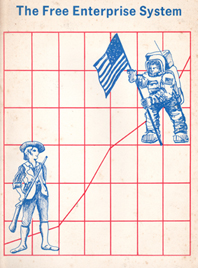 The US Industrial Council (USIC), a coalition of 4,500 companies employing over 3 million people, ran its own campaign to defend free enterprise. It used ‘radio broadcasts, national toll-free telephone lines, newspaper columns, economic research reports, pamphlets for professional groups and civic organizations, posters for display in factories and offices, and other forms of communication’. It distributed 3 million pieces of literature each year, including pamphlets on ‘Who is a Capitalist?’, ‘What is Free Enterprise?’ and ‘The Union Monopoly and the Abuse of Power’.
The US Industrial Council (USIC), a coalition of 4,500 companies employing over 3 million people, ran its own campaign to defend free enterprise. It used ‘radio broadcasts, national toll-free telephone lines, newspaper columns, economic research reports, pamphlets for professional groups and civic organizations, posters for display in factories and offices, and other forms of communication’. It distributed 3 million pieces of literature each year, including pamphlets on ‘Who is a Capitalist?’, ‘What is Free Enterprise?’ and ‘The Union Monopoly and the Abuse of Power’.
The USIC Educational Foundation, the educational arm of USIC, also campaigned for free enterprise. It organized ‘nationwide lecture tours by free enterprise spokesmen and leading free market journalists’; offered prizes and awards ‘to editorialists and political cartoonists for distinguished work’; and provided grants ‘to academics and young scholars who are active in defence of free enterprise principle’.
The Booker T. Washington Foundation, recognizing that ‘black American’s have almost an aversion to capitalism’ and were inclined to see economics in terms of distribution and economic justice, set up Enterprise America to spread the gospel about free enterprise to black people.
The Texas Bureau for Economic Understanding, which later became the American Enterprise Forum, produced an instructional program which was used by some twenty Texas universities. In one of the instructional booklets, produced with the Institute of Free Enterprise Education, it defended profits by arguing that: ‘Without the hope for profit America could not be a nation of free people because people wouldn’t be willing to serve each other if the hope for gain were absent. The rulers would find it necessary to force people to work…’
The National Education Program was another of the many organizations providing free enterprise educational materials for schools. It had been founded in 1936 and had established the Freedom Forum in 1949, becoming ‘the cradle for a nation-wide educational movement supporting the American way of life and its three great pillars—Faith in God, Constitutional Government, and the Private Ownership of the Tools of Production’. By 1968 it was running annual Youth Forums in 12 states where high school students learned about ‘the incomparable advantages of the American system, why and how it produces far more than any form of Socialism or Communism, and how it must be protected from the Communist conspiracy which seeks to destroy it.’
In the 1970s, whilst continuing its annual Freedom Forums and their Youth equivalents, the National Education Program also produced ‘full color animated cartoons’; flannel board presentations; a monthly newsletter; a weekly column for newspapers and trade publications; audio-taped and printed speeches; a Do-It-Yourself Materials Kit for organizing a one-day forum; and a number of films on topics such as ‘A Look at Capitalism’ and ‘The Spirit of Enterprise’. One film – The Truth about Communism – was hosted and narrated by Ronald Reagan. It distributed ‘Activity Suggestions for Citizenship Leaders’ with advise on how to form a group and recruit people to it and become politically active:
High School Juniors and Seniors are mature enough to join the crusade to eliminate citizenship ignorance and apathy. Some of the National Program films, or others on citizenship subjects should be scheduled for school assembly periods, or in history, civics, and economics classes…. Study groups of Juniors and Seniors could be formed, to meet in homes…
Assign some of your group to attend school board meetings, town council sessions, county board or quorum court meetings, and report on problems confronted and the proposed solutions…Seek to get citizenship education programs carried to every family – in school affairs, at clubs, fairs, community-wide events…Write letters-to-the-editor (but do not overdo it). Write carefully composed, well-documented, restrained letters on matters of concern that are being debated…
The US Chamber of Commerce, despite its reluctance to lead a campaign as envisioned by Powell, was happy enough to take part. It produced films, teaching materials and booklets on the economic system and a package entitled ‘Economics for Young Americans’ that included film strips, audio cassettes, lesson plans and text on productivity, profits and the environment. Local chambers of commerce also participated in the campaign.
For example the Los Angeles Area Chamber of Commerce put together a catalogue of expert speakers on issues including government/business relations, commercial and industrial development, and the environment. The Bergen County Chamber of Commerce set up the Bergen Chamber Economic Education Foundation which sponsored college symposia, developed high school curricular and teacher education programs. Various Invest in America Councils set up scholarship programs, speech competitions, school and college conferences and workshops for teachers on economic understanding.
In Texas, a law was passed in 1973 making it mandatory to teach public high school students about ‘the essentials and benefits of the free enterprise system… for at least one semester or quarter…’ In response the Institute for Free Enterprise and the Texas Bureau for Economic Understanding put out a booklet explaining that the motivation for this law was a realization that the American Free Enterprise System ‘has a basic moral foundation’ which the booklet tried to associate with the Bible.